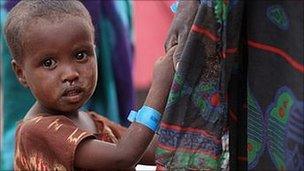UK overseas aid lost to fraud 'could rise'
- Published

MPs are worried about having less control over the cost of aid programmes
More UK aid could be lost to fraud because of changes in the way the money is targeted, MPs have warned.
The Department for International Development (DfID) is refocusing aid on countries seen as fragile and in conflict, such as Somalia and Pakistan.
But the Public Accounts Committee said operating in high-risk countries increased the risk of money being lost.
International Development Secretary Andrew Mitchell said the government had a "zero-tolerance" approach to fraud.
Mr Mitchell said the coalition had made "huge changes" to the way the department runs its finances and that aid is linked to "tangible results on the ground".
The cross-party Public Accounts Committee report also warned that more could be lost to fraud because of plans to spend a greater portion of aid via organisations like the European Commission and the World Bank.
That decision meant the government would have less control over the cost and performance of aid programmes, the committee said.
MPs criticised DfID's "poor understanding" of the scale and possibility of aid being lost to fraud. They said reported losses of 0.016% of total spending in 2010-11 were "unbelievably low".
Margaret Hodge, chairwoman of the Public Accounts Committee, said DfID "could not even give us information as to the expected levels of fraud and corruption and the action they were taking to mitigate it".
The committee added that the selection of aid projects was not based on likelihood of fraud in each country or how projects might be designed to mitigate risks.
'British aid saves lives'
Mr Mitchell said the report reflected the position under Labour and appeared "to take little account of the huge changes the coalition has made since taking office".
"We have transformed the way the department manages its finances, so spending is attached to tangible results on the ground, which are rigorously scrutinised by the new independent aid watchdog," he said.
"This government takes a zero-tolerance approach to corruption. British aid saves lives and we clamp down ruthlessly on any misuse of funds.
"DfID's counter-fraud unit tackles corruption head on, recovering 92% of known losses this year."
Save the Children said the report should not deter donors from providing aid to the most troubled countries.
Brendan Cox, director of advocacy and policy at the charity, said the UK government has "led the world" in making aid more transparent and accountable.
"The Public Accounts Committee's report provides more evidence of why that is so necessary and why the government's increasing focus on this area is needed," he said.
"Nevertheless, we must not let the difficulty of delivering aid in war zones and in fragile states lead to donors choosing the easy option of focusing on the most stable countries.
"Many of the children most in need of help are in the most difficult to reach places. Risk should be managed, not avoided."
DfID's budget is rising despite cuts across other Whitehall departments.
In March the government announced a shake-up of overseas aid with ending of direct development aid to 16 countries and funds being "tightly focused" on those most in need.
- Published20 October 2011
- Published1 March 2011
- Published27 February 2011